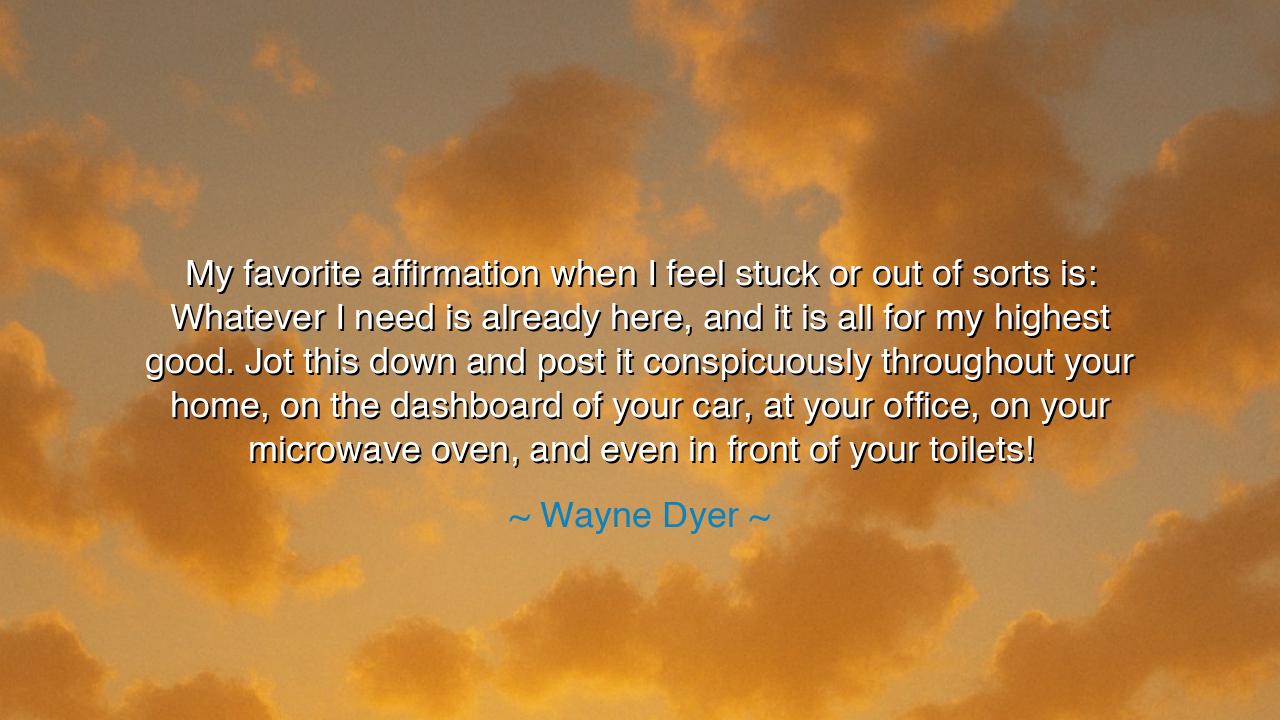
My favorite affirmation when I feel stuck or out of sorts is:
My favorite affirmation when I feel stuck or out of sorts is: Whatever I need is already here, and it is all for my highest good. Jot this down and post it conspicuously throughout your home, on the dashboard of your car, at your office, on your microwave oven, and even in front of your toilets!






In the hush between breath and heartbeat, the teacher Wayne Dyer offers a small, shining tool: “My favorite affirmation when I feel stuck or out of sorts is: Whatever I need is already here, and it is all for my highest good. Jot this down and post it conspicuously throughout your home, on the dashboard of your car, at your office, on your microwave oven, and even in front of your toilets!” Hear how the words move—first a centering creed, then a ritual for inscribing it into the very architecture of daily life. He is teaching us not merely to think differently but to place the thought where the eyes must fall, so that the mind remembers its oath as often as the body turns a corner.
The core of the saying is a fierce gentleness: Whatever I need is already here. This is not denial of hardship; it is a refusal to exile our power to some distant horizon. It is the wisdom of sufficiency, the old monastic knowing that the well is beneath the feet of the wanderer. And then the crown: for my highest good. Not my quickest comfort, nor my loudest craving, but the deeper fitness of things—a trust that life, however knotted, can be braided toward purpose if I meet it awake. In the style of the ancients, this is a vow of alignment: to stop wrestling the river and learn its current.
Dyer’s counsel to jot this down and post it conspicuously is the craft of remembrance. The elders understood that the mind is a leaky jar; what we hear at dawn is spilled by noon. So they carved maxims over doorways, stitched proverbs into garments, kept tablets at bedside. A note on the dashboard, a card at the office, a scrap on the microwave oven, even a smile-making sign before the toilets—these are not superstitions but stations on a pilgrimage through the ordinary, where the eye’s glance becomes the heart’s rehearsal. Repetition makes grooves; grooves make roads; roads carry us when willpower is tired.
Consider a tale from long ago. Marcus Aurelius, emperor yet student of the inner life, wrote his Meditations as reminders to himself—lines copied in tents and palaces, keystones against panic and pride. He did not write for publication; he wrote to post wisdom within reach of his own next breath. In the same spirit, Dyer’s instruction is a modern “Meditations,” sewn into kitchens and dashboards so that philosophy is not a book we visit but a house we live inside. The emperor scrawled in wax tablets; we scrawl on sticky notes. The lineage is the same.
A more recent parable: a nurse in a city ward, frayed by night shifts, taped three cards in her life’s narrow corridors. By the time clock: Whatever I need is already here. By the breakroom kettle: for my highest good. By the mirror before she masked her face: breathe. The notes did not shorten her shift, but they steadied her stance. When supplies were thin, she remembered resourcefulness; when tempers burned, she recalled her chosen center. Weeks later she laughed at the one on the restroom door—yet it caught her eye when nothing else could, and the day turned by one compassionate degree.
The origin of Dyer’s line is the practical mysticism he preached: the world within shapes the world without. He knew mood follows meaning, that attention is an instrument which must be tuned courageously and often. By making the affirmation tactile—inked, taped, placed—he binds heaven to the countertop. The creed stops being a cloud and becomes a compass. And a compass is most needed not on the mountain peak but in the fog, where we wish for rescue and receive, instead, direction.
So what is the lesson we hand to our children? That sovereignty begins with sentence and is kept by ritual. Speak your affirmation not once but many times; do not trust memory—write it where you cannot avoid it. Let the house become a catechism: the home whispers it at breakfast, the dashboard chants it in traffic, the office repeats it between tasks, the microwave oven hums it while leftovers turn, the humble toilets grin it back at you when you most need a wry reminder. Allow ordinary places to become small temples of recollection.
Practical rites for today: (1) Write the exact words—“Whatever I need is already here, and it is all for my highest good.” Place five copies where your eyes naturally go. (2) Pair each sighting with one breath: inhale on “already here,” exhale on “highest good.” (3) Keep a brief “evidence ledger”: each evening, note one moment the day proved the creed—help received, insight arrived, strength found. (4) When resistance mocks the practice, smile and continue; skepticism is merely the mind’s old habit asking to be rehired. (5) After thirty days, refine the placement; move the notes you’ve begun to ignore and refresh the ink. Do this, and the sentence will cease to be a wish. It will become a way—your way—of walking through the world with a steady, generous heart.






AAdministratorAdministrator
Welcome, honored guests. Please leave a comment, we will respond soon